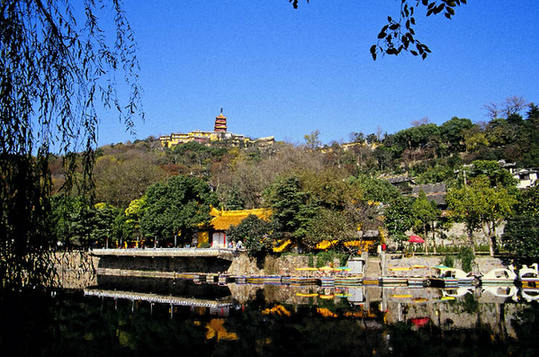|
Langshan Mountain
Langshan is the last green mountain the Yangtze sees before it flows into the sea. It is only just over 100 meters tall, but it has a delicate beauty and is the site of the home temple dedicated to Mahasthamaprapta, a bodhisattva who represents the power of wisdom, often found in a trinity with Amitabha and Avalokitesvara. Because of its religious importance, Langshan is rated as the most important of the "Eight Lesser Buddhist Mountains."
Langshan's religious heritage can be traced back to the Tang Dynasty, when the first buildings of the present-day Guangjiao Temple were erected. In the following dynasties, Buddhist construction continued.
Langshan also has sites of secular interest. Beilu (Northern Slope) Garden was the summer residence of Zhang Jian. It is a tranquil garden house with a southern-style delicate architecture, amid a man-made landscape set off by the precipitous beauty of the northern slope of the mountain.
The beauty of Langshan is best appreciated from its top. The Yangtze River rushes eastward below your feet, and boat sails dot the river and the sea beyond. Looking farther away to the horizon, you feel like you are standing on the edge of the world.
 |
| Langshan Mountain. |
Private Garden
Shuihui (Water Painted) Garden in Nantong's Rugao County immediately reminded me of Shenyuan Garden in Shaoxing, Zhejiang Province, and the love story of Lu You and Tang Wan. Lu You (1125-1210) was one of ancient China's most famous poets. Shenyuan was where he first met Tang Wan and where, after being forced to divorce her, he penned a poem on one of the garden walls beautifully and euphemistically expressing his broken heart. The poem has been extolled as a classic to this day.
A similar romance, though not as tragic, also breathes life into the picturesque milieu of Shuihui Garden. The protagonist Mao Pijiang (1611-1693) was a distinguished man of letters in the late Ming and early Qing dynasties. It was in this garden that Mao started his romance with Dong Xiaowan, one of the top eight geishas (beautiful women of artistic versatility who were trained from childhood to entertain intellectuals and upper-class people) along the Qinhuai River in the vicinity of Jiangsu's Nanjing.
No sooner had I stepped inside the garden, than my guide pointed at a wooden two-storied building with lattice windows, telling me it was Dong Xiaowan's boudoir. Dong met Mao Pijiang in nearby Suzhou, and fell in love with him at first sight. At the time, however, Mao was in love with Chen Yuanyuan, a well-known geisha from Suzhou, and declined Dong's love. Later, after Mao lost track of Chen Yuanyuan, his friend Qian Qianyi took Dong Xiaowan out of her servitude and brought her from Suzhou to Rugao. Dong stayed in the wooden building in Shuihui Garden for three months before she married Mao Pijiang. Folk tales and literature describe them as "heavenly blessed lovers" who were always seen together and lived a secluded life of literature and music. There are many inscriptions in Shuihui Garden, some by celebrated men of letters from the dynastic period. One of them reads, "Xiaowan is a talented and beautiful woman. One day, handsome Pijiang took the Elegant Beauty of the East Sea to scale Golden Mountain. With oars splashing, four or five dragon boats (down the mountain) furrowed the waves, while thousands of tourists up the mountain followed behind the couple, pointing at them and remarking that 'the Queen of the Sea was on an outing with her spouse...'"
Dong Xiaowan was the most gifted of the "Eight Beauties of the Qinhuai River." Colorful Butterflies, which she painted at the age of 15, is now in the Wuxi Municipal Museum collection. At an auction in Shanghai in 2004, another painting she did in her teens, Sorrow Over Mount Gu, sold for RMB 450,000. As the daughter-in-law of the Mao family, Dong Xiaowan conscientiously performed housewife duties and cooked for the entire family, becoming one of the top ten chefs of ancient China. A few dishes and desserts she invented have been passed down to this day, such as Tiger-veined Pork and Dong's Candy. She died of "overwork" at the age of 28, and Mao Pijiang wrote a 4,000-character piece of prose, Reminiscences of the Plum Shadows Studio, pouring out his broken heart in a touching way.
Shuihui Garden is the only private garden built against an ancient city wall. It represents the cream of classic Chinese garden architecture, and from every angle it conveys the beauty of a classic landscape scroll.
The garden was first built in Wanli's reign (1572-1620) during the Ming Dynasty. It is centered on a pond, which branches out and divides the garden into sections. Along its winding course are scattered a house and a handful of pavilion-style buildings and arbors. The rest of the garden is dedicated to water scenery, typical of gardens on the Yangtze River Delta plain.
On June 25, 2001, Shuihui Garden was listed among the fifth group of cultural sites under national protection.
|
